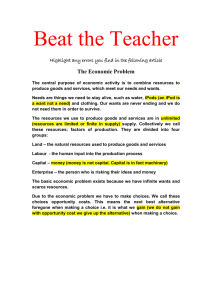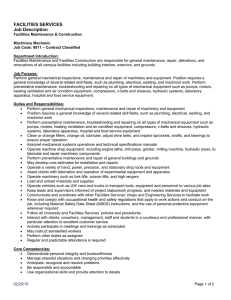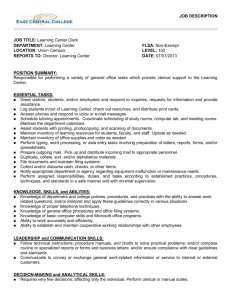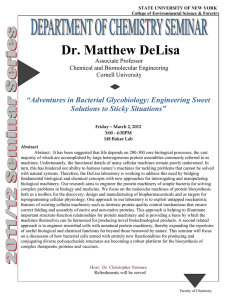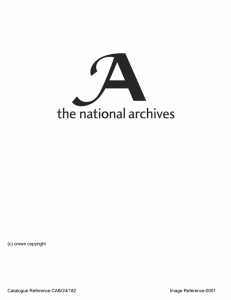tdmmb807b detect and identify the cause of machinery malfunctions
advertisement
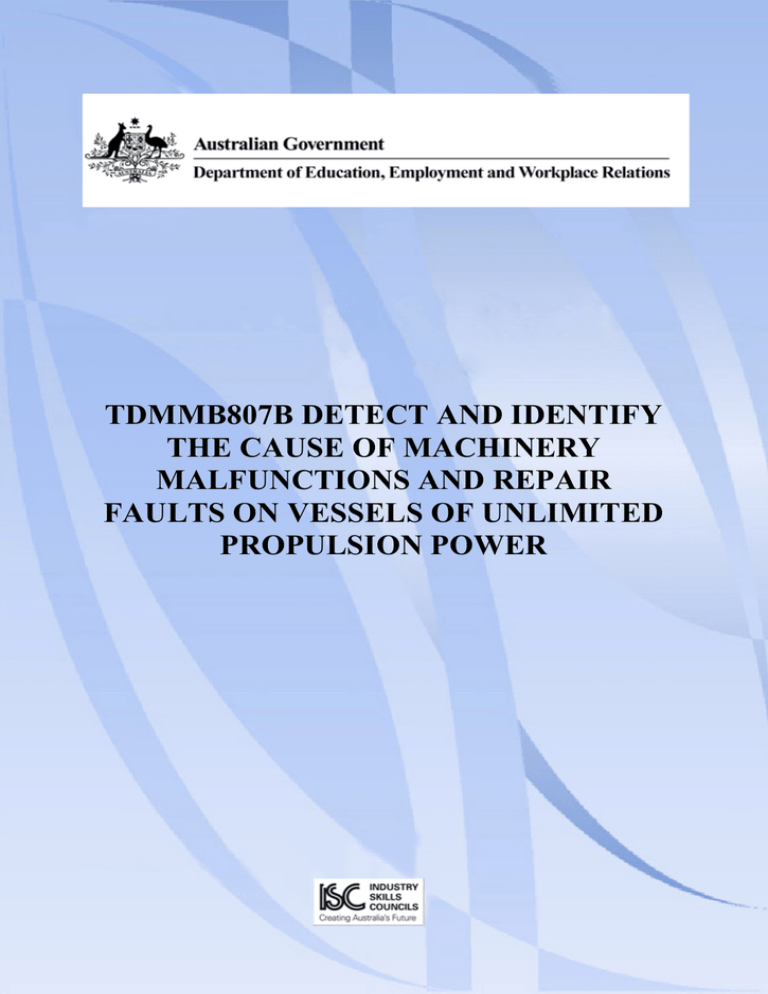
TDMMB807B DETECT AND IDENTIFY THE CAUSE OF MACHINERY MALFUNCTIONS AND REPAIR FAULTS ON VESSELS OF UNLIMITED PROPULSION POWER Release: 1 TDMMB807B DETECT AND IDENTIFY THE CAUSE OF MACHINERY MALFUNCTIONS AND REPAIR FAULTS ON VESSELS OF UNLIMITED PROPULSION POWER Date this document was generated: 10 October 2012 TDMMB807B DETECT AND IDENTIFY THE CAUSE OF MACHINERY MALFUNCTIONS AND REPAIR FAULTS ON VESSELS OF UNLIMITED PROPULSION POWER Modification History Not applicable. Unit Descriptor UNIT DESCRIPTOR: This unit involves the skills and knowledge required by a Chief Engineer to detect and identify the cause of machinery malfunctions and repair faults on a commercial vessel powered by main propulsion machinery of unlimited propulsion power. This includes the management and coordination of relevant maintenance and fault finding activities and the application of advanced diagnostic and problem solving techniques to maintenance procedures. Application of the Unit Application of the The unit has application in qualifications for Chief Engineer on a unit vessel of unlimited propulsion power operating in international waters, i.e. Advanced Diploma of Transport&Distribution(Marine Engineering Class 1). Licensing/Regulatory Information Licensing/legislati The unit is consistent with the relevant sections of STCW 95 and ve requirements Marine Orders under the Australian Navigation Act 1912, describing requirements for a Chief Engineer on a vessel of unlimited propulsion power operating in international waters. Pre-Requisites Not applicable. Approved © Commonwealth of Australia, 2012 Page 3 of 25 Transport & Logistics Industry Skills Council TDMMB807B DETECT AND IDENTIFY THE CAUSE OF MACHINERY MALFUNCTIONS AND REPAIR FAULTS ON VESSELS OF UNLIMITED PROPULSION POWER Date this document was generated: 10 October 2012 Employability Skills Information Not applicable. Elements and Performance Criteria Pre-Content Elements describe Performance Criteria describe the required performance needed the essential to demonstrate achievement of the element. Assessment of outcomes of a unit performance is to be consistent with the Evidence Guide. of competency. Elements and Performance Criteria ELEMENT PERFORMANCE CRITERIA . . 1 Manage the detection, identification and investigation of machinery malfunctions and faults a The detection, identification and investigation of machinery malfunctions and faults is coordinated and managed in accordance with the responsibilities of an Engineer Class 1. b The operation of shipboard machinery is monitored as per vessel's survey requirements and manufacturer's instructions and performance is compared with specifications and recommended limits of performance c Out of specification performance and faults are identified as per marine engineering practice d Advanced diagnostic techniques are used to investigate poor performance and faults and appropriate action is initiated to rectify problems identified e Appropriate action is taken to prevent damage in accordance with vessel's planned maintenance system or procedures, established marine engineering practice, safety regulations and manufacturer's instructions f Faulty equipment and components are identified and are reported, and action is initiated as required for isolation, tagging and repair or replacement in as per company procedures and established marine engineering practice Approved © Commonwealth of Australia, 2012 Page 4 of 25 Transport & Logistics Industry Skills Council TDMMB807B DETECT AND IDENTIFY THE CAUSE OF MACHINERY MALFUNCTIONS AND REPAIR FAULTS ON VESSELS OF UNLIMITED PROPULSION POWER Date this document was generated: 10 October 2012 TDMMB807B DETECT AND IDENTIFY THE CAUSE OF MACHINERY MALFUNCTIONS AND REPAIR FAULTS ON VESSELS OF UNLIMITED PROPULSION POWER ELEMENT PERFORMANCE CRITERIA 1 Manage the detection, identification and investigation of machinery malfunctions and faults (continued) g Decisions are made to carry out temporary or permanent repairs depending on the vessel's position and circumstances h Appropriate consultation is undertaken with classification society and marine administration concerning the nature of the repairs and any contingency or emergency action required i Repair processes and the organisation and control of engine room personnel are managed to facilitate repairs is as per company procedures and practice 2 Repair faults in machinery a Identified faults in shipboard machinery are investigated using advanced fault finding and problem solving techniques b Malfunctioning or faulty machinery is correctly isolated, and disassembled if necessary, as per manufacturer's instructions and established practice c Damaged or faulty components are repaired or replaced in accordance with company's planned maintenance system or procedures, manufacturer's instructions and established marine engineering practice d Repaired machinery is reassembled in accordance with manufacturer's instructions and established marine engineering practice e Repaired machinery is restarted and adjusted as per vessel's procedures and manufacturer's instructions and in consultation with relevant personnel f Performance of repaired machinery and associated safety devices, control systems and alarms is tested in accordance with manufacturer's instructions Approved © Commonwealth of Australia, 2012 Page 5 of 25 Transport & Logistics Industry Skills Council TDMMB807B DETECT AND IDENTIFY THE CAUSE OF MACHINERY MALFUNCTIONS AND REPAIR FAULTS ON VESSELS OF UNLIMITED PROPULSION POWER Date this document was generated: 10 October 2012 ELEMENT PERFORMANCE CRITERIA g Performance against recommended performance specifications is confirmed and the machinery is recommissioned as per vessel's procedures a 3 Complete maintenancea nd repair documentatio b n Correct records are made relating to maintenance and repair operations and machinery failure incidents 4 Follow safety and hazard control procedures a Tests, inspections and repairs of vessel machinery and associated safety devices, control systems and alarms are conducted as per safety regulations and company procedures b Maintenance and repair hazards are identified and action is taken to minimise or eliminate risk to personnel, vessel and the environment All planned maintenance system and repair documentation is completed as per survey and company requirements, the ISM Code and regulations TDMMB807B DETECT AND IDENTIFY THE CAUSE OF MACHINERY MALFUNCTIONS AND REPAIR FAULTS ON VESSELS OF UNLIMITED PROPULSION POWER ELEMENT PERFORMANCE CRITERIA 4 Follow safety and hazard control procedures (continued) c Safety, hazard minimisation and pollution control procedures and national and international regulations are followed at all times during maintenance and repair operations d Where relevant, procedures and precautions necessary for entry into a pump room, fuel tanks or other confined spaces on a vessel are correctly followed e Action is taken in the event of a machinery failure or emergency to secure the machinery and the vessel and maintain the safety of the vessel and persons involved and shipboard emergency and contingency plans are followed Approved © Commonwealth of Australia, 2012 Page 6 of 25 Transport & Logistics Industry Skills Council TDMMB807B DETECT AND IDENTIFY THE CAUSE OF MACHINERY MALFUNCTIONS AND REPAIR FAULTS ON VESSELS OF UNLIMITED PROPULSION POWER Date this document was generated: 10 October 2012 TDMMB807B DETECT AND IDENTIFY THE CAUSE OF MACHINERY MALFUNCTIONS AND REPAIR FAULTS ON VESSELS OF UNLIMITED PROPULSION POWER Required Skills and Knowledge REQUIRED KNOWLEDGE This describes the knowledge required for this unit. 1 Relevant maritime regulations, IMO Conventions and Codes, including AMSA Marine Orders 2 Relevant OH&S legislation, policies and procedures 3 Established engineering practice for the checking, maintenance and repair of marine machinery, including electrical machinery, systems and equipment 4 Operational characteristics and performance specifications for the different types of shipboard machinery usually found on a vessel of 3,000 kW propulsion power or more 5 Advanced diagnostic techniques for carrying out shipboard machinery testing, troubleshooting and repair as part of maintenance procedures to ensure compliance with the company and survey requirements and established safety rules and regulations 6 Procedures for coordinating the overall management of planned maintenance systems and procedures for the condition monitoring of machinery, including responsibilities and requirements covered by various forms of vessel survey 7 The nature and causes of typical shipboard machinery malfunctions and the available methods for their detection and repair, including advanced marine machinery malfunction fault finding techniques 8 Maintenance and repair hazards and problems and appropriate preventative and remedial action and solutions 9 Safe procedures for handling heavy machinery and component parts during maintenance and repair of shipboard machinery 10 Safe procedures for the use of hand and power tools and maintenance equipment during maintenance and repair of shipboard machinery 11 Procedures for the initiation and coordination of temporary and permanent repair Approved © Commonwealth of Australia, 2012 Page 7 of 25 Transport & Logistics Industry Skills Council TDMMB807B DETECT AND IDENTIFY THE CAUSE OF MACHINERY MALFUNCTIONS AND REPAIR FAULTS ON VESSELS OF UNLIMITED PROPULSION POWER Date this document was generated: 10 October 2012 REQUIRED KNOWLEDGE and/or replacement procedures on board vessels at sea, alongside and in dry dock 12 Safety, environmental and hazard control precautions and procedures relevant to shipboard machinery inspection and maintenance operations 13 Principal features of vessel construction and principles of transverse and longitudinal stability 14 A basic understanding of the properties and application of materials and structures typically used in the construction of a vessel of unlimited propulsion power and its associated operational machinery 15 Types of maintenance and repair records that must be maintained on a vessel to meet the requirements of the company, survey requirements and regulatory authorities 16 Maritime communication techniques needed during maintenance and repair operations 17 Purpose and content of material safety data sheets 18 Procedures for the testing of boiler water, machinery cooling water and lubricating oil 19 Principles of fluid power control systems, including: a system function requirements TDMMB807B DETECT AND IDENTIFY THE CAUSE OF MACHINERY MALFUNCTIONS AND REPAIR FAULTS ON VESSELS OF UNLIMITED PROPULSION POWER b methods of displaying system functions c elementary programming and program modification for programmable logic controllers (PLCs) d safety requirements 20 Principles of air-conditioning and refrigeration systems, including: a principles of operation b performance indicators Approved © Commonwealth of Australia, 2012 Page 8 of 25 Transport & Logistics Industry Skills Council TDMMB807B DETECT AND IDENTIFY THE CAUSE OF MACHINERY MALFUNCTIONS AND REPAIR FAULTS ON VESSELS OF UNLIMITED PROPULSION POWER Date this document was generated: 10 October 2012 b methods of displaying system functions c characteristics, hazards and handling requirements of CFCs and HCFCs d safety and environmental requirements of air-conditioning and refrigeration systems 21 Principles and procedures of machinery lubrication, including: a theory and types of lubrication b relative characteristics, and applications of mineral and synthetic oils c contaminants that may affect lubricants, their effect on machinery performance, and action that can be taken to avoid and remedy contamination of lubricants 22 Principles of mechanics as they relate to forces, pressures, stress and strains in shipboard dynamic machinery, including: a statics (primarily non-concurrent systems) b friction c dynamics d balancing e simple harmonic motion f radial, circumferential and, longitudinal stress g strain energy h beam deflection i buckling and crippling loads and struts j combined stress, shear stress k fluid mechanics l losses in pipes, fittings and pumps m torsion, hollow and solid shafts n loads due to liquid head o structural strength and vibration of vessels Approved © Commonwealth of Australia, 2012 Page 9 of 25 Transport & Logistics Industry Skills Council TDMMB807B DETECT AND IDENTIFY THE CAUSE OF MACHINERY MALFUNCTIONS AND REPAIR FAULTS ON VESSELS OF UNLIMITED PROPULSION POWER Date this document was generated: 10 October 2012 b methods of displaying system functions p gears, including epicyclic gearing TDMMB807B DETECT AND IDENTIFY THE CAUSE OF MACHINERY MALFUNCTIONS AND REPAIR FAULTS ON VESSELS OF UNLIMITED PROPULSION POWER 23 Principles of transverse and longitudinal stability and principles of naval architecture and vessel construction relevant to detection, identification and repair of faults, including: a draught, trim and heel b forces on the rudder and stress in the rudder stock c propellers d structural strength and vibration of vessels e vessel measurement and classification f load-line g stability calculations h free surface effects i dry docks j lifesaving equipment k hull repairs and maintenance 24 Principles of thermodynamics and heat and heat engines relevant to detection, identification and repair of faults, including: a heat transfer, including log mean temperature and circular pressure vessels b gases c gas cycles d properties and expansion of steam e steam cycles, including a specific understanding of the use of entropy charts and modifications to the steam cycle Approved © Commonwealth of Australia, 2012 Page 10 of 25 Transport & Logistics Industry Skills Council TDMMB807B DETECT AND IDENTIFY THE CAUSE OF MACHINERY MALFUNCTIONS AND REPAIR FAULTS ON VESSELS OF UNLIMITED PROPULSION POWER Date this document was generated: 10 October 2012 23 Principles of transverse and longitudinal stability and principles of naval architecture and vessel construction relevant to detection, identification and repair of faults, including: f boilers and evaporators g steam turbines, including an understanding of isentropic efficiency h combustion with a specific understanding of volumetric analysis i refrigeration and air-conditioning, including the use of entropy charts 25 Principles of electrotechnology, marine electrical practice and marine automation and control relevant to detection, identification and repair of faults, including: a electromagnetism and electrostatics b the electrical circuit c electrolytic action and cells d theory and calculations of relevant AC and DC machines e cabling, distribution and lighting systems TDMMB807B DETECT AND IDENTIFY THE CAUSE OF MACHINERY MALFUNCTIONS AND REPAIR FAULTS ON VESSELS OF UNLIMITED PROPULSION POWER f control gear g switch gear h deck machinery i principles, calculations and diagnostics for shipboard electronic components and systems, including: i electronics principles ii integrated circuits iii microprocessors iv PLCs Approved © Commonwealth of Australia, 2012 Page 11 of 25 Transport & Logistics Industry Skills Council TDMMB807B DETECT AND IDENTIFY THE CAUSE OF MACHINERY MALFUNCTIONS AND REPAIR FAULTS ON VESSELS OF UNLIMITED PROPULSION POWER Date this document was generated: 10 October 2012 f control gear v process control theory vi instruments, calibration and testing vii electronic control, surveillance, measurement and recording systems vii telemetering devices i ix alarm systems x main and auxiliary machinery control and UMS Approved © Commonwealth of Australia, 2012 Page 12 of 25 Transport & Logistics Industry Skills Council TDMMB807B DETECT AND IDENTIFY THE CAUSE OF MACHINERY MALFUNCTIONS AND REPAIR FAULTS ON VESSELS OF UNLIMITED PROPULSION POWER Date this document was generated: 10 October 2012 f control gear 26 Procedures for the use and care for hand, power and special tools 27 Special machinery and equipment required for special cargoes such as chemicals, oil, refrigerated products, etc. TDMMB807B DETECT AND IDENTIFY THE CAUSE OF MACHINERY MALFUNCTIONS AND REPAIR FAULTS ON VESSELS OF UNLIMITED PROPULSION POWER REQUIRED SKILLS This describes the basic skills required for this unit. 1 Communicate effectively with other personnel when detecting and identifying the cause of machinery malfunctions and repairing faults 2 Interpret and follow safe maintenance and repair procedures on a vessel 3 Read and interpret machinery performance readings and indications 4 Read and interpret vessel and machinery specifications, machinery design drawings, machine drawings, operational manuals, specifications and electrical and control circuit diagrams 5 Read and interpret material safety data sheets 6 Provide leadership to other shipboard personnel when managing the testing and maintenance of electronic control equipment and systems 7 Solve problems that can occur when detecting and identifying the cause of machinery malfunctions and repair faults on a vessel, take appropriate remedial action, and initiate appropriate solutions 8 Carry out calculations required when detecting and identifying the cause of machinery malfunctions and repair faults 9 Adapt to differing types of equipment and systems from one vessel to another and when equipment and systems are changed 10 Store and care for hand, power and special tools and instruments needed when detecting and identifying the cause of machinery malfunctions and repairing faults 11 Select and use appropriate tools, instruments and equipment required when Approved © Commonwealth of Australia, 2012 Page 13 of 25 Transport & Logistics Industry Skills Council TDMMB807B DETECT AND IDENTIFY THE CAUSE OF MACHINERY MALFUNCTIONS AND REPAIR FAULTS ON VESSELS OF UNLIMITED PROPULSION POWER Date this document was generated: 10 October 2012 TDMMB807B DETECT AND IDENTIFY THE CAUSE OF MACHINERY MALFUNCTIONS AND REPAIR FAULTS ON VESSELS OF UNLIMITED PROPULSION POWER detecting and identifying the cause of machinery malfunctions and repairing faults Evidence Guide Evidence Guide TDMMB807B DETECT AND IDENTIFY THE CAUSE OF MACHINERY MALFUNCTIONS AND REPAIR FAULTS ON VESSELS OF UNLIMITED PROPULSION POWER The Evidence Guide provides advice on assessment and must be read in conjunction with the Performance Criteria, Required Skills and Knowledge, the Range Statement and the Assessment Guidelines for this Training Package. 1 Critical aspects Assessment must confirm appropriate knowledge and skills to: of evidence a Manage fault finding and repair activities on a vessel of required to unlimited propulsion power demonstrate competency in b Monitor the performance of shipboard machinery against this unit specifications on a vessel of unlimited propulsion power c Identify malfunctioning and faulty machinery and components and initiate appropriate action for repair or replacement d Apply advanced diagnostic techniques to the troubleshooting of malfunctioning and faulty machinery and carry out required repairs e Exercise all required safety, environmental and hazard control precautions and procedures when overseeing the operation, maintenance and repair of shipboard machinery f Identify machinery maintenance faults and repair problems and hazards and take appropriate action g Communicate effectively with others during maintenance and repair operations Approved © Commonwealth of Australia, 2012 Page 14 of 25 Transport & Logistics Industry Skills Council TDMMB807B DETECT AND IDENTIFY THE CAUSE OF MACHINERY MALFUNCTIONS AND REPAIR FAULTS ON VESSELS OF UNLIMITED PROPULSION POWER Date this document was generated: 10 October 2012 2 Evidence required for demonstration of consistent performance h Ensure adherence to national and international maritime regulations a Performance is demonstrated consistently over a period of time and in a suitable range of contexts b Consistently applies underpinning knowledge and skills when: 1 assessing operational performance of shipboard mechanical and electrical machinery and equipment 2 identifying shipboard mechanical and electrical machinery and equipment malfunctions and faulty plant and equipment 3 taking action to minimise any damage and pollution that could be caused by machinery malfunctions 4 managing, controlling and carrying out repairs of shipboard mechanical and electrical machinery and equipment maintenance and repairs 5 applying advanced diagnostic techniques when identifying and evaluating mechanical and electrical machinery and equipment maintenance and repair problems and determining appropriate courses of action 6 identifying and implementing improvements to mechanical and electrical machinery and equipment checking, maintenance and repair procedures Evidence Guide (continued) TDMMB807B DETECT AND IDENTIFY THE CAUSE OF MACHINERY MALFUNCTIONS AND REPAIR FAULTS ON VESSELS OF UNLIMITED PROPULSION POWER 2 Evidence required for demonstration of consistent performance (continued) Approved © Commonwealth of Australia, 2012 7 applying safety precautions relevant to mechanical and electrical machinery and equipment maintenance, and repair operations 8 completing mechanical and electrical machinery and equipment maintenance and repair documentation and records Page 15 of 25 Transport & Logistics Industry Skills Council TDMMB807B DETECT AND IDENTIFY THE CAUSE OF MACHINERY MALFUNCTIONS AND REPAIR FAULTS ON VESSELS OF UNLIMITED PROPULSION POWER Date this document was generated: 10 October 2012 c Shows evidence of application of relevant workplace procedures, including: 1 relevant sections maritime regulations 2 OH&S regulations, pollution control and hazard prevention procedures 3 issue resolution procedures 4 safety management system procedures and work instructions 5 machinery security procedures 6 following on-board housekeeping processes 7 waste, pollution and recycling management processes 3 Context of assessment d Action is taken promptly to report and/or rectify machinery malfunctions, non-conformities, accidents, hazardous occurrences and safety incidents in accordance with regulations, company procedures and the ISM Code e Work is managed, controlled and completed systematically with required attention to detail f Recognises and adapts appropriately to cultural differences in the workplace, including modes of behaviour and interactions among crew and others a Assessment of competency must comply with the assessment requirements of the relevant maritime regulations b Assessment of this unit must be undertaken within relevant marine authority approved and audited arrangements by a registered training organisation: 1 As a minimum, assessment of knowledge must be conducted through appropriate written/oral examinations, and 2 Appropriate practical assessment must occur: i at the registered training organisation; and/or ii on an appropriate working or training vessel Approved © Commonwealth of Australia, 2012 Page 16 of 25 Transport & Logistics Industry Skills Council TDMMB807B DETECT AND IDENTIFY THE CAUSE OF MACHINERY MALFUNCTIONS AND REPAIR FAULTS ON VESSELS OF UNLIMITED PROPULSION POWER Date this document was generated: 10 October 2012 Evidence Guide (continued) TDMMB807B DETECT AND IDENTIFY THE CAUSE OF MACHINERY MALFUNCTIONS AND REPAIR FAULTS ON VESSELS OF UNLIMITED PROPULSION POWER 4Specific resources Access is required to opportunities to: required for a participate in a range of practical and theoretical assessment assignments, exercises, case studies and other assessments that demonstrate the skills and knowledge to check and repair machinery and equipment typically found on a vessel of unlimited propulsion power, including the ability to identify an appropriate range of possible machinery malfunctions and carry out related maintenance and repair solutions; and/or b carry out checks, fault and related repairs of shipboard machinery in a range of operational situations on a commercial or training vessel of unlimited propulsion power Range Statement Range Statement TDMMB807B DETECT AND IDENTIFY THE CAUSE OF MACHINERY MALFUNCTIONS AND REPAIR FAULTS ON VESSELS OF UNLIMITED PROPULSION POWER The Range Statement relates to the unit of competency as a whole. It allows for different work environments and situations that may affect performance. VARIABLE 1. SCOPE GENERAL CONTEXT Approved © Commonwealth of Australia, 2012 Page 17 of 25 Transport & Logistics Industry Skills Council TDMMB807B DETECT AND IDENTIFY THE CAUSE OF MACHINERY MALFUNCTIONS AND REPAIR FAULTS ON VESSELS OF UNLIMITED PROPULSION POWER Date this document was generated: 10 October 2012 The Range Statement relates to the unit of competency as a whole. It allows for different work environments and situations that may affect performance. a. Work must be carried out: 1 in compliance with mandatory rules and regulations and IMO Conventions and Codes, including the relevant sections of the AMSA Marine Orders and ensuring that applicable codes, guidelines and standards recommended by IMO, the classification societies and maritime industry organisations are taken into account b. Work is performed: 1 relatively independently under broad operational requirements, with accountability and responsibility for self and others in achieving the prescribed outcomes c. Work involves: 1 the application of marine engineering practice and advanced diagnostic techniques to the repair of machinery typically found on a vessel of unlimited propulsion power across a wide and often unpredictable variety of machinery malfunctions or faults. Contribution to the development and implementation of a broad plan or strategy for shipboard machinery maintenance and repair is required and accountability and responsibility for self and others in achieving the outcomes is involved d. Work requires: 1 significant judgement in planning, engineering and leadership functions related to machinery repair operations and procedures. This includes management and control of personnel, analysis of the situation, and decision making 2. WORKSITE ENVIRONMENT a Machinery may 1 that typically found on any Australian or international include commercial vessel of unlimited propulsion power 1 by day or night in both normal and emergency situations b Machinery performance monitoring and 2 under any permissible conditions of weather repair may be 3 while underway carried out Approved © Commonwealth of Australia, 2012 Page 18 of 25 Transport & Logistics Industry Skills Council TDMMB807B DETECT AND IDENTIFY THE CAUSE OF MACHINERY MALFUNCTIONS AND REPAIR FAULTS ON VESSELS OF UNLIMITED PROPULSION POWER Date this document was generated: 10 October 2012 The Range Statement relates to the unit of competency as a whole. It allows for different work environments and situations that may affect performance. 4 during berthing and unberthing operations 5 while anchored or moored Range Statement (continued) TDMMB807B DETECT AND IDENTIFY THE CAUSE OF MACHINERY MALFUNCTIONS AND REPAIR FAULTS ON VESSELS OF UNLIMITED PROPULSION POWER VARIABLE SCOPE b Machinery 6 in dry dock performance monitoring and 7 when bunkering repair may be 8 during cargo operations carried out (continued) 1 steam, diesel, diesel electric and gas turbine propulsion c Types of systems and controls machinery may include: 2 electrical systems and controls, including prime movers 3 batteries, transformers, switchboards, distribution systems, lighting systems 4 steering gear, stabilisers, bow thrusters, rudders 5 fluid power systems and controls 6 deck machinery 7 pumps and pumping systems 8 auxiliary systems and controls, including Approved © Commonwealth of Australia, 2012 i fresh and salt water cooling systems ii diesel generators Page 19 of 25 Transport & Logistics Industry Skills Council TDMMB807B DETECT AND IDENTIFY THE CAUSE OF MACHINERY MALFUNCTIONS AND REPAIR FAULTS ON VESSELS OF UNLIMITED PROPULSION POWER Date this document was generated: 10 October 2012 VARIABLE SCOPE iii turbo alternators iv lubricating oil cooling systems v fuel, oil, gas, coal vi air starting vii lubrication viii bilge and ballast system, oily water separator ix refrigeration and air-conditioning plant and equipment x personal and cargo ventilation systems xi on-board air compressors and compressed air and control air systems xii waste management and pollution control systems xiii evaporators xiv inert gas generator xv cargo pumps, tank washing machines and associated systems xvi purifiers and clarifiers xvii heaters and heat exchangers xvii sewage plant i Approved © Commonwealth of Australia, 2012 xix fixed firefighting installations and fire control systems xx portable firefighting equipment Page 20 of 25 Transport & Logistics Industry Skills Council TDMMB807B DETECT AND IDENTIFY THE CAUSE OF MACHINERY MALFUNCTIONS AND REPAIR FAULTS ON VESSELS OF UNLIMITED PROPULSION POWER Date this document was generated: 10 October 2012 Range Statement (continued) TDMMB807B DETECT AND IDENTIFY THE CAUSE OF MACHINERY MALFUNCTIONS AND REPAIR FAULTS ON VESSELS OF UNLIMITED PROPULSION POWER VARIABLE SCOPE xxi c Types of machinery may include: (continued) auxiliary boilers and waste heat generators xxii lifesaving appliances xxii maintenance to hull and vessel side valves i xxiv radio and navigation equipment d Propulsion plant configurations may include: 1 low speed, medium and high speed diesel propulsion 2 stern tube bearing 3 fixed pitch and CPP 4 direct drive shaft 5 diesel electric 6 steam turbine propulsion - oil/gas/coal-fired boilers 7 gas turbine 8 reduction gears 9 thrust blocks, detuners and shaft bearings 1 e Testing and repair equipment may 2 include: 3 4 Approved © Commonwealth of Australia, 2012 meters, gauges and other test equipment computer displays of performance parameters hand tools, such as spanners, wrenches, screwdrivers, hacksaws, etc. greasing and lubrication tools Page 21 of 25 Transport & Logistics Industry Skills Council TDMMB807B DETECT AND IDENTIFY THE CAUSE OF MACHINERY MALFUNCTIONS AND REPAIR FAULTS ON VESSELS OF UNLIMITED PROPULSION POWER Date this document was generated: 10 October 2012 VARIABLE SCOPE 5 electric power tools, such as grinders, lathes, drills, etc. 6 pneumatic power tools, such as grinders, sanders, drills, etc. 7 welding equipment 8 block and tackle 9 portable and manual lifting equipment and hydraulic jacks 10 material safety data sheets 11 protective clothing and equipment such as: i eye and ear protection ii safety boots and helmet iii dust and fume masks Range Statement (continued) TDMMB807B DETECT AND IDENTIFY THE CAUSE OF MACHINERY MALFUNCTIONS AND REPAIR FAULTS ON VESSELS OF UNLIMITED PROPULSION POWER VARIABLE SCOPE f 1 moving heavy loads in an unsafe working environment 2 unsecured machinery, components or repair equipment 3 slippery deck 4 welding equipment 5 sharp tools and implements 6 power tools 7 moving and rotating machinery 8 flammable liquids, vapours and fuel Maintenance and repair hazards may include: Approved © Commonwealth of Australia, 2012 Page 22 of 25 Transport & Logistics Industry Skills Council TDMMB807B DETECT AND IDENTIFY THE CAUSE OF MACHINERY MALFUNCTIONS AND REPAIR FAULTS ON VESSELS OF UNLIMITED PROPULSION POWER Date this document was generated: 10 October 2012 VARIABLE SCOPE 9 faulty machinery equipment handling equipment and lifting gear 10 using equipment beyond safe working limits 11 poor housekeeping procedures 12 non-compliance with safe working procedures 13 electrical wiring and systems 14 hot pipes and valves (e.g. steam, fuel oil, lubricating oil) 15 cold pipes and valves (e.g. refrigeration, liquefied gas cargoes) 16 working at heights and in confined spaces g Emergencies may include: 1 loss of propulsion 2 loss of electrical power 3 loss of steering 4 flooding of engine room 5 fire or explosion in engine room 6 loss of refrigeration 7 loss of water making ability 8 loss of control systems 9 fuel oil, lubrication oil, steam and gas leaks 10 overheating and overspeed of machinery, governors, emergency trips Approved © Commonwealth of Australia, 2012 Page 23 of 25 Transport & Logistics Industry Skills Council TDMMB807B DETECT AND IDENTIFY THE CAUSE OF MACHINERY MALFUNCTIONS AND REPAIR FAULTS ON VESSELS OF UNLIMITED PROPULSION POWER Date this document was generated: 10 October 2012 Range Statement (continued) TDMMB807B DETECT AND IDENTIFY THE CAUSE OF MACHINERY MALFUNCTIONS AND REPAIR FAULTS ON VESSELS OF UNLIMITED PROPULSION POWER VARIABLE SCOPE h Documentation 1 and records may include: 2 ISM Code safety management system plans, procedures, checklists and instructions vessel's and company's planned maintenance system, repair procedures and instructions 3 machinery and vessel manufacturer's specifications, instructions and recommended procedures 4 maintenance log, running sheets and records 5 computer database of running information and maintenance records 6 vessel's survey as it relates to shipboard machinery 7 vessel's safety and emergency contingency plans and procedures 8 machinery and vessel manufacturer's specifications, instructions and recommended procedures 9 relevant sections of national and international regulations, IMO Conventions and Codes, including AMSA Marine Orders, classification society rules dealing with shipboard machinery maintenance, repair and survey inspections 10 instructions of relevant maritime authorities and classification societies concerning shipboard machinery maintenance and repair Approved © Commonwealth of Australia, 2012 Page 24 of 25 Transport & Logistics Industry Skills Council TDMMB807B DETECT AND IDENTIFY THE CAUSE OF MACHINERY MALFUNCTIONS AND REPAIR FAULTS ON VESSELS OF UNLIMITED PROPULSION POWER Date this document was generated: 10 October 2012 VARIABLE i SCOPE Applicable 1 sections of national and international regulations, IMO legislation, Conventions and Codes, including AMSA Marine Orders and regulations and classification society rules related to shipboard machinery codes may maintenance and repair on vessels of unlimited propulsion include: power 2 relevant international, Commonwealth, State and Territory OH&S legislation 3 relevant international, Commonwealth, State and Territory engineering practice standards Unit Sector(s) Not applicable. Field Field B Equipment Checking and Maintenance Relationship to other units Relationship to other units The unit may be assessed in conjunction with other units that relate to the functions of the occupation(s) concerned. Approved © Commonwealth of Australia, 2012 Page 25 of 25 Transport & Logistics Industry Skills Council
